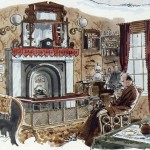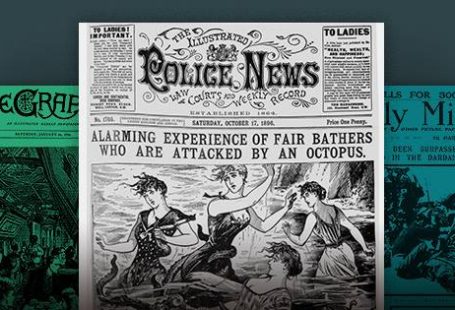Each month, we will examine the newspapers from 100, 75, or 50 years ago and pull out the top headlines as well as the lesser known events from our villages and towns. This month we found stories from the ongoing First World War, a career criminal, a modern Don Juan, tips for housekeeping, and more.
War-Promotions
On this day, in 1917, the front page of the Illustrated London News displayed the faces of the British generals who received promotions in the New Year. In the centre of the page, is the portrait of Field Marshall General Douglas Haig. Haig was commander-in-chief of the British Army during the Battle of the Somme. The Illustrated London News also provides vibrant illustrations from battlefields of the Frist World War. On page 8 is a double page illustration of British troops storming a German stronghold at Beaumont. The image shows the troops, along with a massive tank, rushing over the trench into the German territory.


War at home
The papers are filled with daily war reports from Europe and Africa, but you can also read how the war affected every part of society. The Cheltenham Chronicle recounted that the Stroud Urban Council monthly meeting’s chief agenda was the congratulations of Captain Eugene Paul Bennett, who was awarded the British Army’s highest distinction, the Victoria Cross. The district planned to hold a reception in his honour. On the same page, The Cheltenham Chronicle reported that the omnibus services from Kings Head Hotel in Cirencester to the GWR station had been affected by the war. Because of the lack of customers and the fact that the bus has been running at a loss, the service was ended, disrupting travel for many who still used the service.

Criminal – A bad record
Reports from the local assizes in the Warwick and Warwickshire Advertiser showed that Alfred Dicken, a 51-year-old labourer, pled guilty to stealing 12 shirts and sentenced to 18 months of hard labour. However, the report revealed that this was not Dickens first offense. The chairman said the prisoner had a ‘shocking record’ and had been in out and gaol from 1904 with charges across the Midlands. I wonder if we will come across the career criminal again in the newspapers?

Romance – Don Juan soldier
In the Birmingham Mail’s Table Talk column you will find a story of a modern day Don Juan. The story told that a private was seen at the New Street Station with no less than fourteen women around him to bid him farewell. When the train arrived at the platform, the women lined up to give ‘the warrior a hearty buss on the lips’. The train then moved off, and the soldier must have felt content with himself. All the girls walked away amicably together.

The home- Housekeeping tips and recipes
To start off the New Year, Derbyshire Times and Chesterfield Herald provides excellent tips for housekeeping for example cool rain water mixed with soda ‘will remove machine grease from washable fabrics’. Discover what to do with those leftover small pieces of soap. ‘Keep all odd pieces of soap and place them in a tin, the bottom and top of which have been previously bored into several holes. When you are washing the dishes, etc. place the tin into the basin and pour your hot water through it. You will then have a nice soapy lather’. The article also offers various recipes for fish as a break from all the rich meats consumed during the Christmas season.

Science – Curative S-Rays
On 6 January 1917, The Sphere reported on the latest curative technology in science, the Simpson Lamp. The Sphere provides diagrams of the device and explains its different uses. The Simpson Lamp produced ‘S-Rays’- which were being used to treat shrapnel wounds and even chronic infections. The rays were created by the electric combustion of a mineral called wolframite, a combination of iron and manganese. The article did not go further into the scientific findings but only claimed that many intractable cases were cured after the treatment of S-Rays.

Entertainment – The picture house
The Belfast News-Letter reported that the film East Lynne would be showing at the Lyceum picture house on Antrim Street in Belfast. The film is an adaption of Ellen Wood’s famous novel and involves five acts across 117 scenes. The lead roles are played by Mr Fred Paul and Miss Blanche Forsyth.

Let us know what you find in the newspapers and don’t forget to like us on Facebook or follow us on Twitter.






